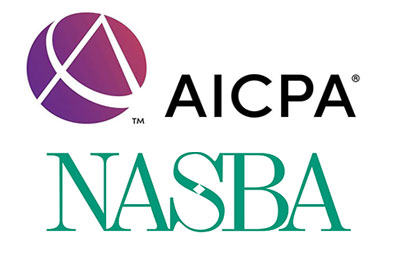AICPA and NASBA Seek Input on Proposed Additional Pathway to CPA Licensure
–
September 17, 2024

In a joint effort to support the next generation of accountants while maintaining accounting’s rigorous public protection mandate, the American Institute of CPAs (AICPA) and the National Association of State Boards of Accountancy (NASBA) have proposed an initiative aimed at helping Certified Public Accountant (CPA) candidates meet initial licensure requirements. The CPA Competency-Based Experience Pathway would provide an additional option for candidates to demonstrate their professional and technical skills after earning a bachelor’s degree and meeting their state’s requirements for accounting and business courses.
Designed to increase flexibility for candidates, respond to market conditions, and protect the public, the pathway allows candidates to meet the final stretch of licensure requirements by exhibiting competencies according to a model framework that has been developed by AICPA and NASBA. The framework was developed with significant input and advice from a diverse cross-section of the profession, including members of an AICPA and NASBA working group made up of practitioners, regulators, academics, and state society leaders.
“The proposed pathway encompasses the perfect mix of flexibility for CPA candidates while maintaining rigor for public protection,” said NASBA President and CEO Daniel J. Dustin, CPA. “We look forward to the input and direction from the 55 U.S. Boards of Accountancy on this important and necessary framework to strengthen the CPA pipeline.”
Attaining the competencies is expected to take most candidates a year but there is flexibility in the timing for completion. Candidates pursuing this additional pathway would also be required to complete a separate year of general experience and pass the CPA Exam. Competencies would be verified in the workplace by licensed CPAs.
Public input on the proposed model competency framework and other aspects of the potential additional pathway can be submitted through December 6.
“Our goal is to ensure that accounting professionals have the necessary experience, knowledge, and competencies to handle the complex nature of CPA work, while also providing paths to licensure that reflect market conditions and make licensure as accessible as possible,” said Susan Coffey, CPA, CGMA, the CEO of Public Accounting for AICPA. “Feedback from the profession is essential to building a workable pathway.”
The competency framework at the heart of the proposal includes seven professional and three technical competencies. Candidates would be required to exhibit all professional competencies and at least one of the three technical competencies, which would be verified by one or more evaluators in their organization.
Professional competencies are spelled out in areas such as ethical behavior, critical thinking, and communication. Technical skills are in audit and assurance, tax and financial reporting.